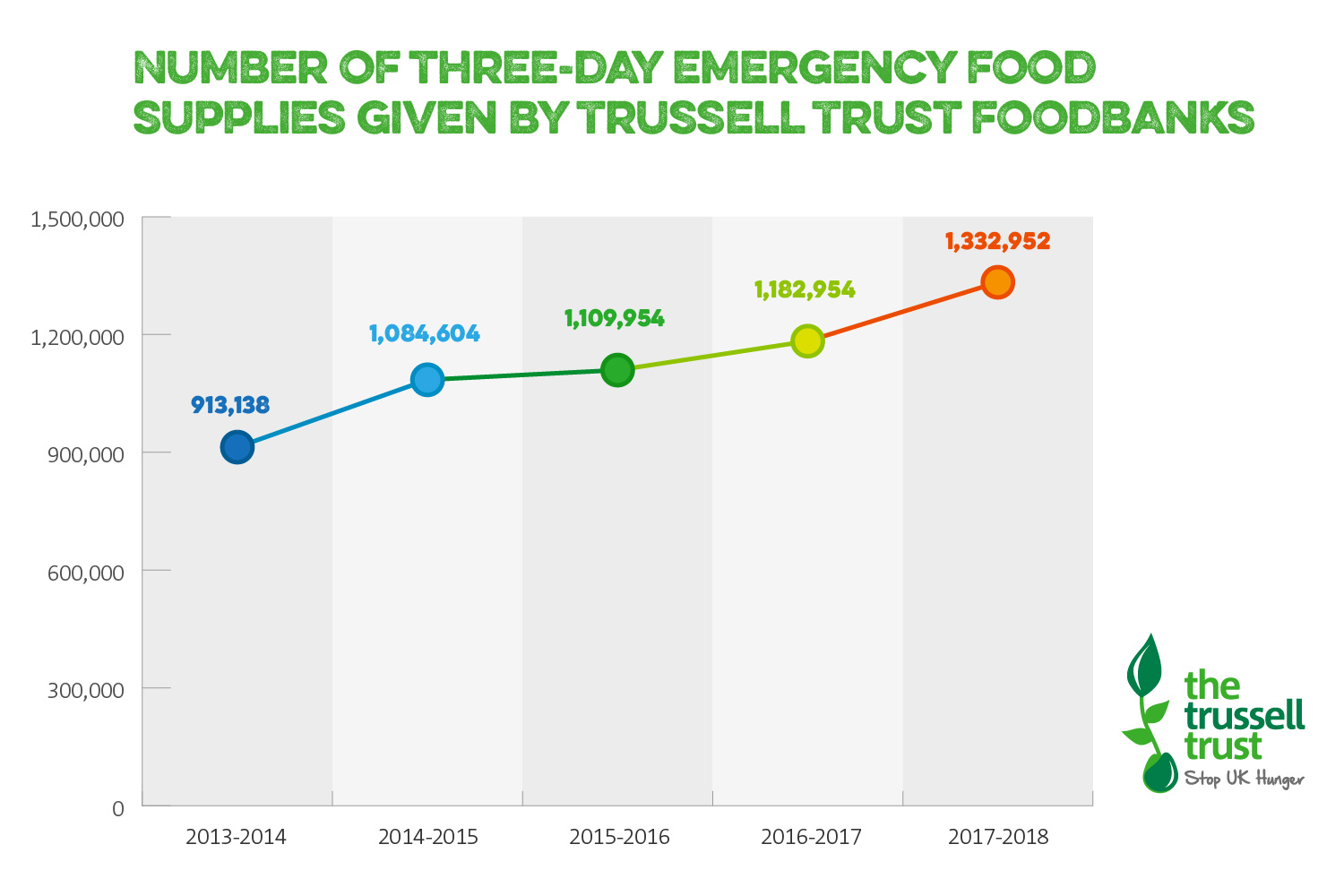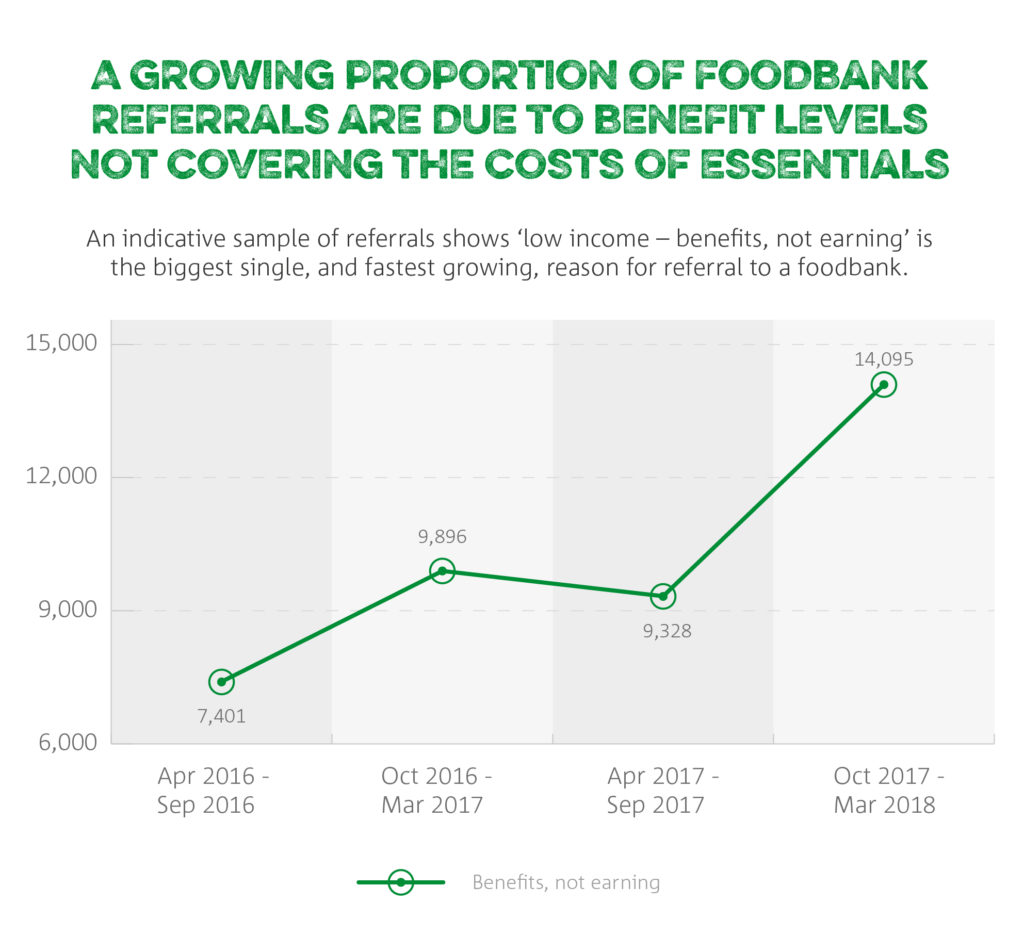Between 1st April 2017 and 31st March 2018, The Trussell Trust’s foodbank network distributed 1,332,952 three day emergency food supplies to people in crisis, a 13% increase on the previous year. 484,026 of these went to children. This is a higher increase than the previous financial year, when foodbank use was up by 6.64%.
For the first time, new national data highlights the growing proportion of foodbank referrals due to benefit levels not covering the costs of essentials, driving the increase in foodbank use overall. ‘Low income – benefits, not earning’ is the biggest single, and fastest growing, reason for referral to a foodbank, with ‘low income’ accounting for 28% of referrals UK-wide compared to 26% in the previous year. Analysis of trends over time demonstrates it has significantly increased since April 2016, suggesting an urgent need to look at the adequacy of current benefit levels.**
Emma Revie, Chief Executive of The Trussell Trust, explains:
“As a nation we expect no one should be left hungry or destitute – illness, disability, family breakdown or the loss of a job could happen to any of us, and we owe it to each other to make sure sufficient financial support is in place when we need it most.
“It’s hard to break free from hunger if there isn’t enough money coming in to cover the rising cost of absolute essentials like food and housing. For too many people staying above water is a daily struggle. It’s completely unacceptable that anyone is forced to turn to a foodbank as a result.
“Universal Credit is the future of our benefits system. It’s vital we get it right, and ensure levels of payment keep pace with the rising cost of essentials, particularly for groups of people we know are already more likely to need a foodbank – disabled people, people dealing with an illness, families with children and single parents.”
Debt accounted for an increasing percentage of referrals – 9% up from 8% of referrals in the past year – and the statistics show the essential costs of housing and utility bills are increasingly driving foodbank referrals for this reason, with the proportion of referrals due to housing debt and utility bill debt increasing significantly since April 2016.
The other main primary referral reasons in 2017-18 were benefit delays (24%) and benefit changes (18%). New data about the types of benefit change driving foodbank use is clear: whilst referrals due to ‘benefit sanction’ have declined over the last year, those due to ‘reduction in benefit value’ have the fastest growth rate of all referrals made due to a benefit change, and those due to ‘moving to a different benefit’ have also grown significantly.
Universal Credit is not the only benefit people at foodbanks are experiencing issues with, but it is a significant factor in many areas. New analysis of foodbanks that have been in full UC rollout areas for a year or more shows that these projects experienced an average increase of 52% in the twelve months after the full rollout date in their area. Analysis of foodbanks either not in full UC areas, or only in full rollout areas for up to three months, showed an average increase of 13%.*
The release of the figures is accompanied by the publication of Left Behind: Is Universal Credit Truly Universal? , a new report into Universal Credit and foodbank use published today. The findings, from a survey of 284 people on UC referred to foodbanks, show the adverse impact of the initial wait, the lack of available statutory support, the inability of UC payments to cover the cost of living for people who most need it, and poor administration.
The charity is consequently calling for benefit levels to be uprated in line with inflation to ensure payments keep pace with the cost of living, particularly for disabled people and families with dependent children who are particularly at risk of needing a foodbank, and for a requirement to be placed upon Local Authorities to deliver a true Universal Support service to everyone who starts a Universal Credit claim. It is also asking for an urgent inquiry into poor administration within Universal Credit, so errors such as incorrect payments along with poor communication issues can be tackled.
Ends
Contact The Trussell Trust Press Office at 020 3137 3699 or [email protected].
Notes to Editor
Left Behind: Is Universal Credit Truly Universal? can be accessed here.
The findings come from a survey of people referred to foodbanks in The Trussell Trust network, delivered by foodbank volunteers in 30 foodbanks in areas of full Universal Credit rollout in England, Scotland and Wales. The sample size is 284 surveys, representing at least 148 households with dependent children, and all were gathered between February and March 2018.
About The Trussell Trust:
- The Trussell Trust is an anti-poverty charity that runs a network of 428 foodbanks across the UK.
- It is simply not acceptable that so many people in the UK face hunger, and we won’t sit by whilst increasing numbers of people are expected to hit crisis and need a foodbank’s help. We’re committed to creating long term change, challenging the structural issues that lock people into poverty and seeing an end to the need for foodbanks.
- Whilst we work towards this, we’re determined to ensure everyone referred to a foodbank in our network receives the best possible support, so we help foodbanks to offer much more than food: volunteers are supported to provide a listening ear and help resolve the underlying cause of crisis either through signposting onto relevant local charities or providing on-site immediate support, such as money advice and budget cookery courses.
- Read more at trusselltrust.org
*Trussell Trust foodbank statistics:
- Trussell Trust statistics are a measure of volume rather than unique users. Our data system can calculate the average visit frequency within a time period and shows people visited on average around two times in 2017-18, leading us to estimate that approximately 666,476 people are likely to have been unique users in this year.
- The data is collected using an online system into which foodbanks enter data from each foodbank voucher, and the number of three day emergency food supplies (containing enough food for 10 meals) is recorded.
- Referral reasons are recorded by the agency or professional referring someone to a foodbank:
- ‘Benefit delays’ refer to people not receiving benefits to which they are entitled on time, this category can also include problems with processing new claims, or any other time-lags in people receiving their welfare payments.
- ‘Benefit changes’ refers to the problems resulting from a change in people’s welfare payments, for example, people having their benefits stopped whilst they are reassessed. This can also include a sanction.
- ‘Low income’ refers to anyone whose level of income does not protect them falling into crisis.
- Trussell Trust figures cannot be used to fully explain the scale of foodbank use across the UK, because our figures relate to foodbanks in our network and not to the hundreds of independent food aid providers. Research suggests that Trussell Trust foodbank centres account for roughly two-thirds of all emergency food aid provision facilities in the UK: you can read more about this here.
New analysis of 38 foodbanks that have been in full UC rollout areas for a year or more shows that these projects experienced an increase of 52% in the twelve months following the full rollout date in their area. This has been calculated by summing individual foodbank data for the twelve months after UC full service went ‘live’ in their area and calculating the percentage increase between the start and end points of the ‘best fit’ trend line.
Comparative analysis of random samples of foodbanks taken from 247 that are either not in full UC areas, or only in full rollout areas for up to three months, showed an average increase of 13%. This has been calculated by assigning each foodbank an equivalent ‘go live’ month at random, summing individual foodbank data for 38 foodbanks at a time, and calculating the percentage increase from the point of ‘go live’ and twelve months after it. Over 20 trials with different randomised foodbanks, the average increase was 13%.
** New foodbank referral detail:
For the first time, The Trussell Trust has been able to drill down further into primary reasons for referral to foodbanks in the network, and can compare trends over time using additional data gathered mostly from electronic foodbank referrals since April 2016. Electronic referrals are completed by referral agencies in the same way as traditional paper vouchers, and can gather more detailed information about the reason behind referral. Not every referral to a foodbank in the network is made using an electronic referral. More details on the electronic referral data included in this release available here.




